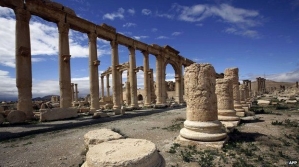
The terror group known as ISIS continued its bloody rampage across Syria on Wednesday, this time taking control over the ancient ruins of Palmyra.
According to Richard Spencer of the Telegraph, ISIS militants stormed the World Heritage site of Palmyra in eastern Syria. They managed to beat back Syrian forces under control of the Assad regime, which retreated and left the Greco-Roman ruins and the main tourist hotel unguarded.
"The regime repositioned its troops between the military security branch headquarters, the castle and the communications tower," resident Abu Laith al-Shaer said. "The ancient site checkpoint and the Khatab hotel were left without troops after the regime withdrew. Regime snipers are on top of most buildings."
However, Spencer reported that even the snipers retreated from their positions, and ISIS later declared victory over the city.
"Checkpoints guarding the ruins, some of the most striking and romantic of the ancient world, were withdrawn as commanders redeployed their forces to the front lines," Spencer wrote.
According to Spencer, there are fears within the international community that the city could meet the same fate under ISIS control as the Assyrian cities of Nimrud and Nineveh in Iraq. UNESCO director Irina Bokova stated that continued fighting in the area would be "putting at risk one of the most significant sites in the Middle East."
"It is imperative that all parties respect international obligations to protect cultural heritage during conflict, by avoiding direct targeting, as well as use for military purposes," Bokova said.
According to a report from Fox News, Syria's antiquities chief, Maamoun Abdulkarim, stated that hundreds of statues have been moved from the ancient city to other safe locations. However, the museum, along with large unmovable monuments, remained in the area.
"Hundreds and hundreds of statues we were worried would be smashed and sold are all now in safe places," Abdulkarim said. "This is the entire world's battle."
According to Fox News, the existence of Palmyra dates back to the second millennium B.C. It has been home to Arabic, Aramaic and Greco-Roman culture and houses the Temple of Ba'al, an ancient theater, and a famous colonnade.
"Given ISIS' past actions, moving the statues [are] a vital precaution," Christopher Jones, author of the Gates of Nineveh blog, said. "The ruins themselves are still under threat though even if there are no statues."
Abdulkarim elaborated on how dire the situation was at Palmyra, now that the city is under ISIS control.
"The situation is very bad," he quipped. "If only five members of ISIL go into the ancient buildings, they'll destroy everything."
According to Fox News, the fall of Palmyra would be a strategic victory for ISIS. That's because it would allow militants access to nearby important gas and oil fields as well as a route to Damascus and the Syrian coast.






